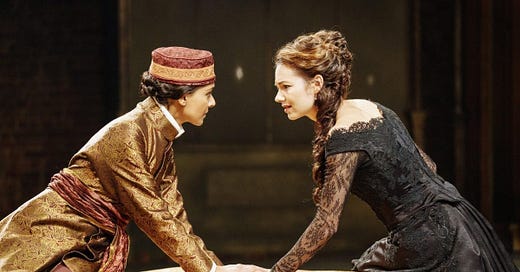In Act 1, Scene 5 of Shakespeare’s play Twelfth Night, we get a moment where Viola, disguised as Cesario, gives a speech to Olivia after the latter has dismissed Viola’s original mission of delivering a message from the Duke to express his love for the lady. Viola describes how she would show her love to Olivia if she were instead the one passionately in love with her as is the Duke.
“Make me a willow cabin at your gate,
And call upon my soul within the house;
Write loyal cantons of contemned love
And sing them loud even in the dead of night;
Halloo your name to the reverberate hills
And make the babbling gossip of the air
Cry out ‘Olivia!’ O, You should not rest
Between the elements of air and earth,
But you should pity me!”
Shakespeare here uses great poetic skills of imagery, metaphor, and rhythm to express emotion in Viola’s speech.
The first line, “Make me a willow cabin at your gate,” is rich with artistic talent and worth looking further into. Viola says she would build a humble willow cabin outside Olivia’s estate. The willow tree is a common symbol of unrequited love and melancholy. It symbolizes a longing for love and unwavering devotion. It also paints a pastoral, humble image of a meek cabin that sits humbly outside the lady’s beautiful estate. The image of a humble cabin expresses that Viola is willing to place herself in a lower setting to express the genuineness of her love. The image of the willow is used by Shakespeare as a metaphor for Viola’s love for Olivia as being one that is willing to be unrequited yet will remain steadfast in hopes that it will be soon manifest.
Shakespeare, through these lines, designs vivid images of nature that compare to Viola’s passions. She will not just sing songs, but “loyal cantons of contemned love.” She will call out her name that does not only travel, but travels through “the reverberate hills and make the babbling gossip of the air cry out.” The echo’s suggest that her love for Olivia is unstoppable. But also it symbolizes the unrequitedness of her love. The echo’s are hollow, symbols of unrequited love, as Olivia has fallen in love with Cesario, not herself as Viola. To finish it dramatically, Viola says that Olivia would not be able to “Rest between the elements of air and earth”, or, she would not be able to go anywhere without knowing of the love Viola would have for her. The natural world—hills, air, and earth—becomes a participant in Viola’s love, amplifying her emotions. This reflects a recurring Shakespearean theme where the natural environment mirrors and magnifies human experiences, blurring the lines between internal emotion and external reality.
The speech largely adheres to Shakespearean iambic pentameter but departs from it to emphasize Viola’s emotional intensity. Enjambment in the lines “Halloo your name to the reverberate hills / And make the babbling gossip of the air” creates a sense of flow which parallels the image of echo’s Viola describes. The line “Cry out “Olivia!” Oh, you should not rest” again becomes irregular, but is done to emphasize “Olivia” by dramatically shifting the stress patterns. Here also, after “Olivia!” is a caesura, which adds to the attention and passion drawn to her name. I can imagine a breathless gasp from Olivia here. The final line, “But you should pity me,” is a catalectic line. This is done to create a feeling of incompletion, to reflect Viola’s vulnerability and the unfulfilled nature of her love.
The speech here from Twelfth Night is a great example of Shakespeare’s many ways to use literary skills to create a memorable scene. Love and passion are expressed clearly in this scene by his vivid imagery, thoughtful metaphors, and clever rhythm techniques.




